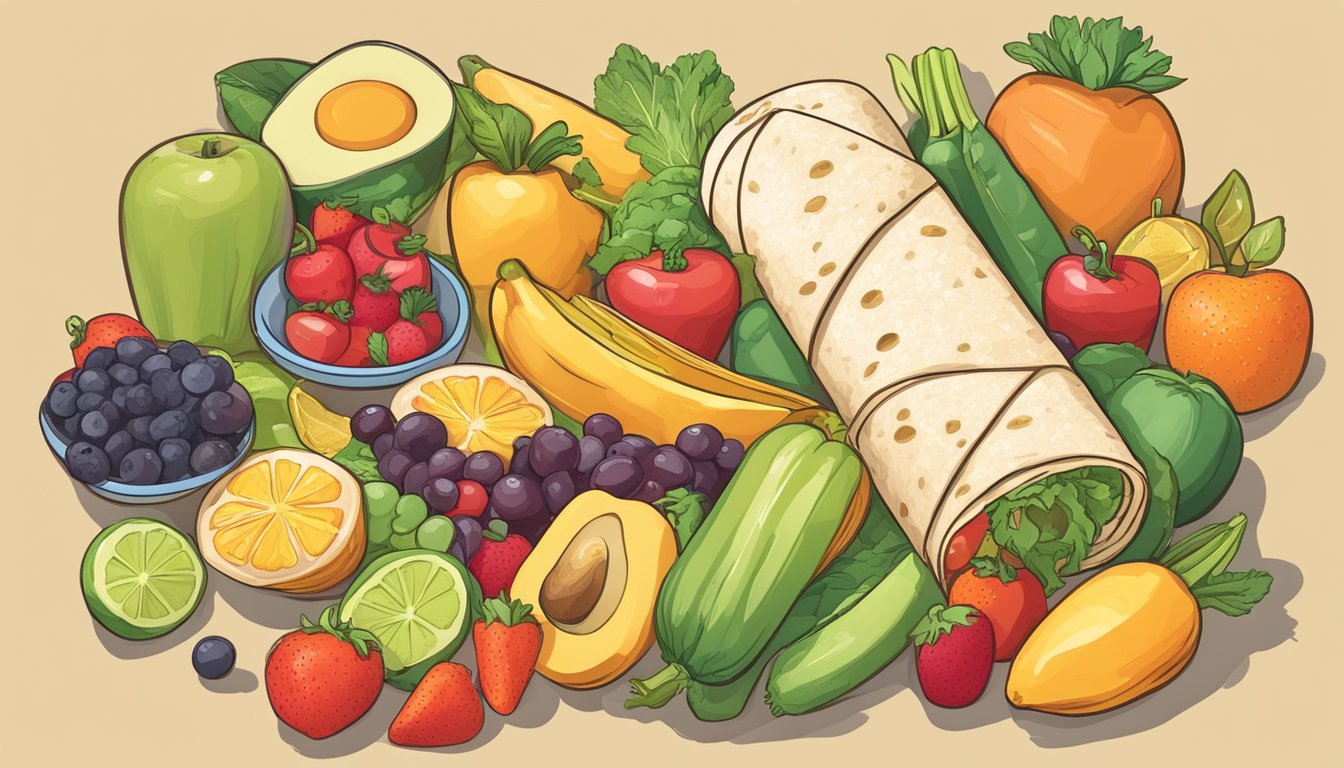Breakfast burritos have gained popularity as a convenient morning meal option, but their health impact is often debated. When prepared with nutritious ingredients and consumed in moderation, breakfast burritos can be part of a balanced diet. The key lies in the choice of fillings and portion control.
A well-crafted breakfast burrito can provide a mix of protein, complex carbohydrates, and healthy fats to fuel energy levels for the day ahead. Ingredients like eggs, lean meats, beans, vegetables, and whole grain tortillas offer essential nutrients. However, it’s important to be mindful of high-calorie additions such as excessive cheese or sour cream.
For those concerned about their health, homemade breakfast burritos allow greater control over ingredients and portions. This approach enables individuals to tailor their morning meal to their specific nutritional needs and preferences while still enjoying a satisfying start to the day.
Nutritional Breakdown of Breakfast Burritos

Breakfast burritos can vary widely in their nutritional content depending on ingredients and preparation methods. The following subsections examine key nutritional components to consider when evaluating breakfast burritos.
Protein Content and Sources
Breakfast burritos often provide a substantial amount of protein. Eggs are a common ingredient, offering high-quality protein with all essential amino acids. A typical burrito may contain 1-2 eggs, providing 6-12 grams of protein.
Cheese adds additional protein, with about 7 grams per ounce. Lean meats like turkey bacon or chicken can boost protein content further, contributing 15-20 grams per serving.
Greek yogurt, sometimes used as a healthier alternative to sour cream, can add 15-20 grams of protein per half-cup serving.
Protein content table:
| Ingredient | Protein (g) |
|---|---|
| 1 egg | 6 |
| 1 oz cheese | 7 |
| 3 oz chicken | 20 |
| 1/2 cup Greek yogurt | 15 |
Fat Content and Types
Fat content in breakfast burritos can range from moderate to high, depending on ingredients. Cheese and meats contribute saturated fats, while ingredients like avocado provide healthier monounsaturated fats.
A typical cheese-filled burrito may contain 15-20 grams of fat, with 5-7 grams being saturated. Adding avocado increases fat content but improves the fat profile with heart-healthy monounsaturated fats.
Cooking methods impact fat content significantly. Grilled vegetables add minimal fat, while ingredients fried in oil can substantially increase overall fat content.
To reduce unhealthy fats:
- Choose lean proteins like grilled chicken or turkey
- Use smaller amounts of cheese or opt for low-fat varieties
- Include avocado for healthy fats
- Use cooking sprays instead of oil when preparing ingredients
Carbohydrate Complexity
Carbohydrates in breakfast burritos primarily come from the tortilla. A standard 10-inch flour tortilla contains about 30-35 grams of carbs.
Whole wheat tortillas offer more fiber and complex carbohydrates compared to refined flour versions. They typically provide 3-4 grams of fiber per tortilla, compared to 1-2 grams in white flour tortillas.
Vegetables like bell peppers, onions, and spinach add minimal carbs while increasing fiber content. Beans, when included, contribute both complex carbs and fiber.
Carbohydrate comparison:
- White flour tortilla: 35g carbs, 1-2g fiber
- Whole wheat tortilla: 35g carbs, 3-4g fiber
- 1/4 cup black beans: 10g carbs, 4g fiber
Vitamins and Minerals
Breakfast burritos can be a good source of essential nutrients, depending on their ingredients. Eggs provide vitamins A, D, E, and B complex, as well as minerals like iron and zinc.
Vegetables significantly boost vitamin and mineral content. Spinach or kale add vitamins A, C, and K, along with iron and calcium. Bell peppers are rich in vitamin C.
Cheese contributes calcium and vitamin B12. Whole wheat tortillas offer more B vitamins and minerals compared to refined flour versions.
Key nutrients in common ingredients:
- Eggs: Vitamins A, D, E, B complex; iron, zinc
- Spinach: Vitamins A, C, K; iron, calcium
- Bell peppers: Vitamin C
- Cheese: Calcium, vitamin B12
- Whole wheat tortilla: B vitamins, iron, magnesium
Health Considerations

Breakfast burritos can have both positive and negative health impacts. Key factors include ingredients, portion sizes, and frequency of consumption. Careful choices allow burritos to fit into a balanced diet.
Calorie Intake and Weight Management
Breakfast burritos can be calorie-dense, potentially contributing to weight gain if eaten frequently. A typical burrito may contain 300-800 calories, depending on ingredients and size.
To manage calorie intake:
- Choose smaller tortillas
- Load up on veggies
- Limit high-calorie additions like cheese and sour cream
- Control portion sizes
Incorporating lean proteins and fiber-rich ingredients can promote satiety, helping with weight management. Balancing burrito consumption with other nutritious meals and regular physical activity is key.
Sodium Levels and Heart Health
Many breakfast burrito ingredients are high in sodium, which can impact heart health and blood pressure. Processed meats, cheese, and store-bought salsas often contribute significant sodium.
Tips to reduce sodium:
- Use fresh ingredients instead of packaged ones
- Choose low-sodium options when available
- Limit added salt during preparation
Excessive sodium intake may lead to hypertension. Those with heart concerns should be especially mindful of sodium content in breakfast burritos.
Cholesterol and Fats
Breakfast burritos can contain substantial amounts of cholesterol and unhealthy fats, primarily from eggs, cheese, and meats. These components may affect cardiovascular health if consumed in excess.
To make healthier choices:
- Use egg whites or limit whole eggs
- Opt for lean meats or plant-based proteins
- Choose low-fat dairy or dairy alternatives
- Include heart-healthy fats like avocado
Balancing ingredients can help create a more nutritious burrito. Incorporating whole grains and vegetables adds fiber, which can help manage cholesterol levels.
Culinary Variations and Their Impact
Breakfast burritos come in many forms, from meaty classics to veggie-packed alternatives. The ingredients and preparation methods can significantly affect their nutritional value and health impact.
Meat-Based vs. Veggie Burritos
Meat-based breakfast burritos often contain scrambled eggs, bacon, sausage, or ham. These provide ample protein but can be high in saturated fat and calories.
Veggie burritos offer a lighter alternative. They typically include colorful vegetables like bell peppers, onions, and tomatoes. Sweet potatoes are a popular addition, providing complex carbohydrates and fiber.
Lean proteins like egg whites or tofu can replace fatty meats. Low-fat cheese can add flavor without excessive calories. These substitutions make veggie burritos a heart-healthier option.
Store-Bought vs. Homemade
Store-bought frozen breakfast burritos are convenient but often contain preservatives and excess sodium. They may use lower-quality ingredients to reduce costs.
Homemade burritos allow for better control over ingredients. Fresh vegetables, whole eggs, and lean meats can be used. Cooking methods like grilling or baking instead of frying can reduce fat content.
Making burritos at home also enables portion control. Smaller tortillas and measured ingredients help manage calorie intake. This approach combines convenience with nutritional benefits.
Traditional vs. Health-Conscious Recipes
Classic breakfast burritos often feature large flour tortillas, full-fat cheese, and generous portions of meat. While tasty, these can be calorie-dense and high in saturated fat.
Health-conscious recipes focus on balanced nutrition. Whole-grain tortillas boost fiber content. Egg whites replace whole eggs to reduce cholesterol. Lean turkey bacon or plant-based alternatives substitute fatty meats.
These recipes incorporate more vegetables for added vitamins and minerals. Avocado provides healthy fats. Greek yogurt can replace sour cream for a protein-rich, lower-fat option.
Practical Tips for Healthier Breakfast Burritos

Crafting nutritious breakfast burritos involves selecting wholesome ingredients, managing portions, and exploring alternative preparations. These strategies can transform this popular morning meal into a balanced and satisfying option.
Ingredient Selection for Optimal Nutrition
Choosing nutrient-dense components is key to creating healthier breakfast burritos. Opt for whole grain tortillas instead of refined flour versions to increase fiber content. Fill the burrito with lean proteins such as egg whites, turkey bacon, or plant-based alternatives.
Incorporate a variety of colorful vegetables like spinach, bell peppers, and tomatoes to boost vitamin and mineral intake. Add black beans or lentils for extra fiber and plant-based protein.
Use avocado as a healthy fat source in place of excessive cheese or sour cream. Sprinkle in herbs like cilantro or parsley for flavor without added calories.
Portion Control and Meal Frequency
Maintaining appropriate portion sizes is crucial for enjoying breakfast burritos as part of a balanced diet. Use smaller tortillas to naturally limit overall size. Fill the burrito with more vegetables and lean proteins than high-calorie ingredients.
Measure out ingredients to avoid overstuffing. A well-proportioned burrito should contain about 1/4 cup each of protein and vegetables, 2 tablespoons of cheese, and a small amount of healthy fats.
Consider breakfast burritos as an occasional meal rather than a daily staple. Alternate with other nutritious breakfast options throughout the week to ensure dietary variety.
Alternative Preparations and Substitutes
Explore healthier cooking methods to reduce unnecessary fats. Grill or bake vegetables instead of sautéing in oil. Use non-stick cookware to prepare eggs with minimal added fats.
Try wrapping burrito contents in large lettuce leaves for a low-carb option. Experiment with different tortilla alternatives such as spinach or whole wheat lavash wraps.
Replace traditional fillings with nutritious substitutes. Use Greek yogurt instead of sour cream for a protein boost. Swap regular cheese for a smaller amount of strong-flavored varieties like feta or sharp cheddar to maintain flavor while reducing calories.
Conclusion

Breakfast burritos can be a nutritious morning meal when prepared thoughtfully. Whole wheat tortillas, lean proteins, and fresh vegetables contribute valuable nutrients and fiber.
Portion control plays a key role in maintaining a balanced diet. Opting for smaller burritos or sharing larger ones can help manage calorie intake.
Homemade versions allow for better ingredient control. Choosing wholesome fillings like black beans, scrambled eggs, and avocado boosts nutritional value.
Fast-food breakfast burritos often contain excessive sodium and saturated fat. Careful selection of restaurant options or preparing burritos at home mitigates these concerns.
Breakfast wraps offer convenience for busy mornings. They provide sustained energy when made with complex carbohydrates and protein-rich ingredients.
Potential drawbacks include high calorie content if overstuffed or loaded with cheese and sour cream. Moderating these additions helps create a more balanced meal.
Breakfast burritos can fit into a healthy eating plan when consumed mindfully. They offer variety among traditional breakfast options and can be customized to individual dietary needs.




